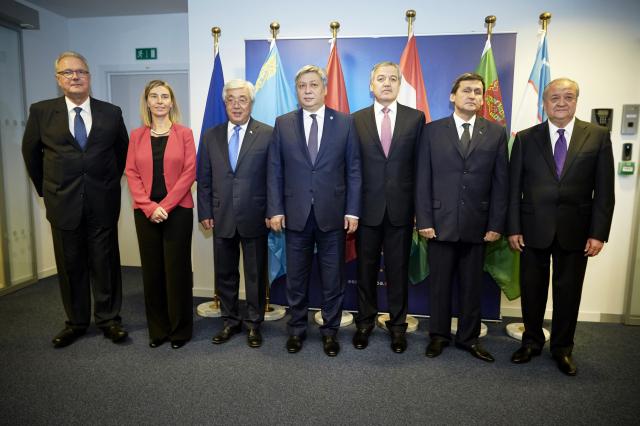The EU must press for an end to repression in Central Asia at its Kyrgyzstan summit

On 7 July, the European Union’s top diplomat, Federica Mogherini and Development Commissioner, Neven Mimica will meet Mogherini’s five regional counterparts from Central Asian countries in Kyrgyzstan’s capital, Bishkek. The highlight of what will no doubt be her last trip to the region in her current mandate is the presentation of the EU’s new Central Asia strategy. This occasion should be used to take stock of the changes in Central Asia’s human rights landscape, but also to strengthen Mogherini’s legacy of the EU’s engagement in the region. The new strategy offers a clear insight into the EU’s aspirations for a more democratic future for Central Asia’s 105 million citizens. It sets itself apart from the 2007 strategy, which largely focused on energy security, and lacked strong ambition for improving human rights in the region. The new EU strategy does not shy away from clearly calling on countries to uphold human rights standards, focusing on freedom of expression and “civil society participation in public decision-making.” It says that regional leaders should promote an environment “that allows rights defenders, journalists and independent trade unionists and employers' organisations to operate freely and safely.” It addresses the need to eradicate torture and stresses that democracy and the rule of law are necessary to make public institutions more responsive and accountable to their citizens. Central Asia has already seen some significant change. In the last three years, though many of the region’s leaders had been in power for decades, three of its leaders have moved on – most recently in Kazakhstan, but also in Uzbekistan and Kyrgyzstan. The EU strategy, while acknowledging these developments, is nevertheless firm that there should be no backtracking on progress, underscoring that the EU will continue to address serious abuses throughout the region -a positive improvement on 2007. But Mogherini should convey several things in Bishkek in order to bed down this new EU-Central Asia strategy. Firstly, she should make it clear that the EU believes effective democracy in Central Asia is attainable if autocratic leaders refrain from putting their desire for power above the rights of their citizens. Expand From left to right: Mr Neven MIMICA, Member of the European Commission; Ms Federica MOGHERINI, High Representative of the EU for Foreign Affairs and Security Policy; Mr Erlan IDRISSOV, Minister for Foreign Affairs of Kazakhstan; Mr Erlan ABDYLDAEV, Minister for Foreign Affairs of Kyrgyzstan; Mr Aslov SIRODJIDIN, Minister for Foreign Affairs of Tajikistan; Mr Rashid MEREDOV, Foreign Affairs Minister of Turkmenistan; Mr Abdulaziz KAMILOV, Minister of Foreign Affairs of Uzbekistan. 2016 European Union From left to right: Mr Neven MIMICA, Member of the European Commission; Ms Federica MOGHERINI, High Representative of the EU for Foreign Affairs and Security Policy; Mr Erlan IDRISSOV, Minister for Foreign Affairs of Kazakhstan; Mr Erlan ABDYLDAEV, Minister for Foreign Affairs of Kyrgyzstan; Mr Aslov SIRODJIDIN, Minister for Foreign Affairs of Tajikistan; Mr Rashid MEREDOV, Foreign Affairs Minister of Turkmenistan; Mr Abdulaziz KAMILOV, Minister of Foreign Affairs of Uzbekistan. In October 2017, Kyrgyzstan had the region’s first peaceful transfer of power from one elected president to another when former President Almazbek Atambaev voluntarily left office at the end of his term. In Uzbekistan, the new president, Shavkat Mirziyoyev, has taken important if modest measures to improve human rights. And in Kazakhstan, thousands of citizens risked detention to peacefully protest the election of Nursultan Nazarbaev’s hand-picked successor in a vote that was deemed neither free nor fair by international election observers.
The time is ripe to promote more open political debate and call for the end to unjustifiable restrictions on the media and activists. Secondly, she should warn Central Asian leaders that the EU won’t tolerate the worst forms of abuses, including the persistence of torture in the region. Such abuses also include the arbitrary arrests and imprisonment in Tajikistan of more than 150 activists, lawyers, journalists and opposition leaders - including from the Islamic Renaissance Party of Tajikistan and the Group 24 opposition movement - since 2015, all of whom face serious ill-treatment in detention and long prison sentences. In Turkmenistan, where the number of political prisoners is extremely difficult to determine, dozens remain forcibly disappeared in the prison system, some for as long as 16 years. Although dozens of detainees have recently been released in Uzbekistan, thousands more remain behind bars for political reasons. Finally, Mogherini should press her host country, Kyrgyzstan to end the wrongful imprisonment of a prominent rights activist. An aging human rights defender, Azimjon Askarov has languished in Kyrgyz prisons since 2010, serving a life sentence handed down after a trial marred with irregularities, credible allegations of torture, and due process violations. His life sentence was upheld even after the UN Human Rights Committee concluded that Askarov was arbitrarily detained and that Kyrgyzstan should release him and quash his conviction. The EU’s calls to release him have fallen on deaf ears. But as Mogherini is also expected to sign a new bilateral deal with Kyrgyzstan, she should spare no effort to have the Kyrgyz authorities promise to release him. Askarov’s release would be a concrete win for the EU’s new approach to Central Asia. Hope is high among civil society in the region that the old norms of arbitrary detention and repression do not have a future in Central Asian countries. Mogherini should support those aspirations and send the message that greater ties with the EU will go hand-in-hand with genuine human right.
Read the full article at the original website
References:
- https://eeas.europa.eu/sites/eeas/files/joint_communication_-_the_eu_and_central_asia_-_new_opportunities_for_a_stronger_partnership.pdf
- /view-mode/modal/311132
- https://www.hrw.org/europe/central-asia/kyrgyzstan
- https://www.hrw.org/europe/central-asia/uzbekistan
- https://www.hrw.org/news/2019/06/09/crackdown-presidential-election-protests-kazakhstan
- https://www.hrw.org/europe/central-asia/tajikistan
- https://www.hrw.org/europe/central-asia/turkmenistan
- https://www.hrw.org/news/2018/12/06/veteran-rights-defender-languishes-kyrgyzstan-jail
- https://www.hrw.org/news/2019/07/01/ngos-letter-high-representative-mogherini-regarding-detained-human-rights-defender
